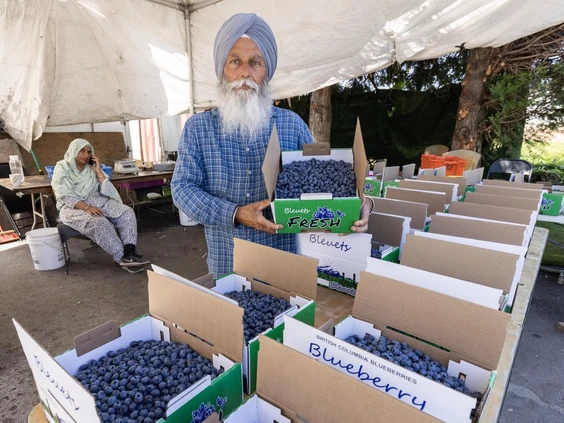For over 45 years, Surjit Singh Sanghera has enjoyed a peaceful life on his quiet farm in Surrey. Nestled at the end of a calm road and surrounded by fields, the blueberry grower valued the stillness and safety the land provided his family. Now, peace is under threat.
A major road extension is planned to run through part of his property, paving over land he has farmed for decades. Sanghera says the project will not only change the quiet character of the area but also reduce his berry yield.
“I’ve lived here for so long,” he said. “Everything is nearby—stores, the Gurdwara, gas, pharmacy. My grandkids run around freely here. But now, that will change. We’ll have to build fences or keep a closer watch.”
The planned expansion involves extending 72nd Avenue five kilometers east, from 152nd Street to Pacific Highway. The goal is to improve traffic flow by adding two lanes in each direction and making space for large farm vehicles on the widened shoulders. The city council recently approved early work to begin the process.
This corridor already connects several key points—from Highway 91 in Delta past schools, homes, and shopping centers—before ending at 152nd Street. The extension would push further through mostly farmland.
The land falls within the Agricultural Land Reserve (ALR), but a 20-meter-wide road allowance from 1875 already exists through the area. Even with that in place, the Agricultural Land Commission requires a formal application before any ALR land can be used. As of now, that step has not yet been taken for the full project.
According to city officials, the plan would remove up to 12 hectares of ALR-protected farmland. An extra half hectare might also be needed for a new intersection at Pacific Highway, though that is still under review.
The city says an application to the Agricultural Land Commission is being prepared for the larger construction phase. However, approval has already been granted to begin ground work between 152nd and 156th streets. This involves preloading the soil by placing large amounts of crushed rock to stabilize it for future paving.
The entire project is part of what the city calls the largest municipal road investment in the province’s history, with a projected cost of $138 million and a completion date expected next year.
Sanghera worries he will lose about 1,000 fully grown blueberry plants. A wooden stake with a pink ribbon now marks where the new road will cut through his farm. Another one is placed near the ditch, showing the limits of construction.
“My land is long and narrow,” he said. “So once they take the road allowance, they’ll need even more space. That will eat into my actual farmland.”
He expects compensation for plants directly removed from his property, but not for those lost within the road allowance area.
Not all local business owners are opposed. Miles Hunter, who owns a garden center at the intersection of 72nd Avenue and 152nd Street, believes the road extension will help his store by bringing in more customers and improving delivery routes.
“I’m hopeful,” he said. “Traffic is already heavy on 64th, 72nd, and 152nd. This might ease that and make access easier for my suppliers from Langley and Abbotsford.”
Still, concerns remain. Dairy farmer Brian Livingston says his 40-hectare farm along Pacific Highway could be split by the road, making it hard to move milk and supplies between fields. He says he has seen early designs but no formal proposal or guarantees of help.
“If farming becomes impossible, that should matter in the Land Commission’s decision,” he said. “I haven’t heard anything about a crossing or access. I doubt they care much about farmland.”
For now, uncertainty surrounds many who live and work along the proposed route. Sanghera, like others, waits for answers while trying to hold on to the land and memories built over a lifetime.

